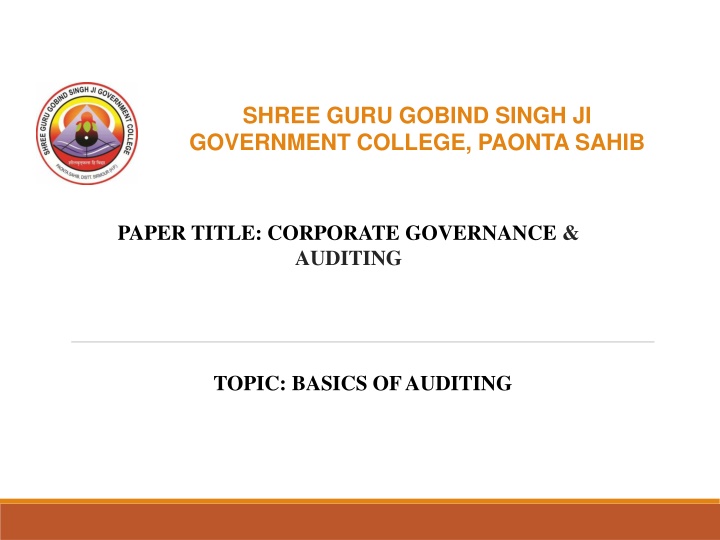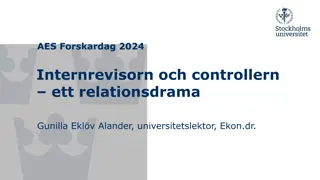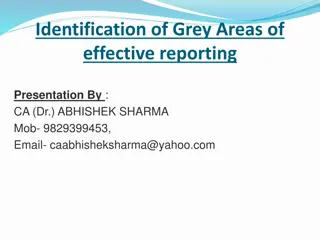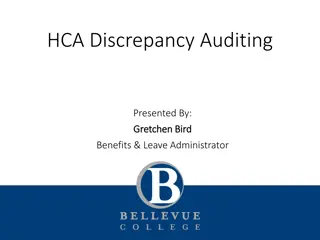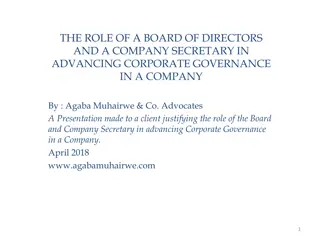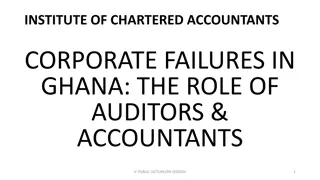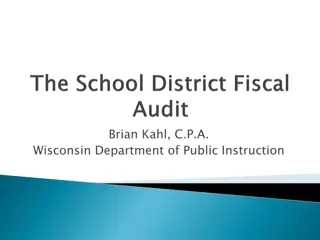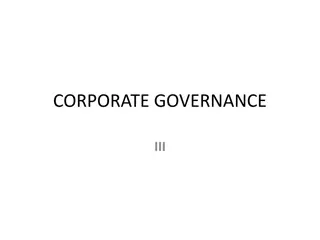Basics of Auditing in Corporate Governance and its Origins
Auditing involves the examination of financial statements to ensure accuracy and reliability. The practice dates back to the early 20th century in India, with a focus on verifying accounting records for transparency. Various definitions and perspectives on auditing are discussed, emphasizing the importance of assessing financial data for compliance with industry standards and management policies.
Download Presentation

Please find below an Image/Link to download the presentation.
The content on the website is provided AS IS for your information and personal use only. It may not be sold, licensed, or shared on other websites without obtaining consent from the author.If you encounter any issues during the download, it is possible that the publisher has removed the file from their server.
You are allowed to download the files provided on this website for personal or commercial use, subject to the condition that they are used lawfully. All files are the property of their respective owners.
The content on the website is provided AS IS for your information and personal use only. It may not be sold, licensed, or shared on other websites without obtaining consent from the author.
E N D
Presentation Transcript
SHREE GURU GOBIND SINGH JI GOVERNMENT COLLEGE, PAONTA SAHIB PAPER TITLE: CORPORATE GOVERNANCE & AUDITING TOPIC: BASICS OF AUDITING
Auditing typically refers to financial statement audits or an objective examination and evaluation of a company s financial statements usually performed by an external third party. Audits can be performed by internal parties and a government entity, such as the Internal Revenue Service (IRS).
An audit can apply to an entire organization or might be specific to a function, process, or production step. Some audits have special administrative purposes, such as auditing documents, risk, or performance, or following up on completed corrective actions. In simple word ,Auditing implies the examination of books of accounts and related documents of an organisation in order to correctly estimate their accuracy , completeness and regularities.
ORIGIN OF AUDITING The word "audit" derives from the Latin word audire which means "to hear . In India,the history of auditing begins from the 1st of April 1914 , when the companies act of 1913 came into force. This act made it mandatory for every company to get its yearly accounts audited and also spelt out the qualification of a person to become an auditor.
DEFINITION OF AUDUTING DEFINITION OF AUDUTING Auditing is an examination of accounting records undertaken with a view to establishment whether they correctly and completely reflect the transactions to which they purport to relate. -L.R.Dicksee. Auditing is concerned with the verification of accounting data determining the accuracy and reliability of accounting statements and reports. - R.K. Mautz . Auditing is a comprehensive examination of the books and records of a business organisation in order to verify their reports and data.
Auditing is the systematic examination of financial statements, records and related operations to determine adherence to generally accepted accounting principles, management policies and stated requirement. - R.E.Schlosser. From all this we can conclude that AUDITING is an examination of accounts to ascertain whether the financial statements give a true and fair view financial position and profit or loss of the business. Auditing is the intelligent and critical test of accuracy, adequacy and dependability of accounting data and accounting statements.
OBJECTIVE OF AUDITING OBJECTIVE OF AUDITING The objective of an audit is to express an opinion on financial statements. The auditor has to verify the financial statements and books of accounts to certify the truth and fairness of the financial position and operating results of the business. Therefore, the objectives of audit are categorized as primary or main objectives and secondary objectives.
PRIMARY OBJECTIVES 1. To Examine the Accuracy of the Books of Accounts An auditor has to examine the accuracy of the books of accounts, vouchers and other records to certify that Profit and Loss Account discloses a true and fair view of profit or loss for the financial period and the Balance Sheet on a given date is properly drawn up to exhibit a true and fair view of the state of affairs of the business. Therefore the auditor should undertake the following steps: Verify the arithmetical accuracy of the books of accounts. Verify the existence and value of assets and liabilities of the companies. Verify whether all the statutory requirements on maintaining the book of accounts has been complied with.
2. 2. To To Express Opinion on Financial Statements Express Opinion on Financial Statements After verifying the accuracy of the books of accounts, the auditor should express his expert opinion on the truthness and fairness of the financial statements. Finally, the auditor should certify that the Profit and Loss Account and Balance Sheet represent a true and fair view of the state of affairs of the company for a particular period. Components of Financial Statement Financial Statement includes the following: Trading and Profit and Loss Account, and Balance Sheet.
SECONDARY OBJECTIVES SECONDARY OBJECTIVES (1) Detection And Prevention of Errors The Institute of Chartered Accountants of India defines an error as, an unintentional mistake in the books of accounts. Errors are the carelessness on the part of the person preparing the books of accounts or committing mistakes in the process of keeping accounting records. Errors which take place in the books of accounts and the duty of an auditor to locate such errors are discussed below:
(2)Detection and Prevention of Frauds (2)Detection and Prevention of Frauds Fraud is the intentional or wilful misrepresentation of transactions in the books of accounts by the dishonest employees to deceive somebody. Thus detection and prevention of fraud is of great importance and constituents an important duty of an auditor. Fraud can be classified as:
3. 3. MANIPULATION OF ACCOUNTS MANIPULATION OF ACCOUNTS There is a very common practice almost in every organization, some dishonest employees have intention to commit this type of fraud. Manipulation of accounts is the procedure to alter books of accounts in such a way that there will be an increase or decrease in the amount of profit to achieve some personal objectives of the high officials. It is very difficult for the auditors to identify such frauds which may be due to manipulation of accounts.
Causes of Manipulation of Accounts Causes of Manipulation of Accounts There are different reasons for manipulation of accounts. The reasons are: To get more commission calculated on profit. For evasion of income tax and sales tax. To get huge loan from financial institutions by showing more profit in the books of accounts. To declare more dividend to the shareholders. By showing more profit than actual to get confidence of the shareholders. To make secret reserves by showing less income or by showing more expenses in the books of accounts.
BENEFITS OF AUDITING (1) Provide True And Fair View Auditing provides fair and true view of financial statements of business organization. It examines the authenticity of profit and loss account and balance sheet of business concern and identifies any discrepancies in it. This way the audited book of accounts exhibits correct picture of business conditions. (2) Detect Errors And Frauds Auditor verifies all books of accounts maintained by business for detecting any errors and frauds. Errors are innocent mistake that occurs without any intention whereas frauds are deliberate mistakes. These both have adverse effects on organizational performance and need to be timely monitored. Process of auditing enables in overcoming these mistakes by timely detecting them and taking corrective actions accordingly.
(3) Assist In Accounts Consistency Auditing has an efficient role in maintaining the regularity of accounts in every organization. An auditor raises questions in case if accounts are not maintained consistently by business. He may give unclear auditing opinion if he found any irregularities in book of accounts. Therefore, auditing puts pressure on maintaining a consistency in book of accounts. (4) Independent Viewpoint Auditing provide an independent viewpoint about company s financial statements when performed by external auditors. He inspects all accounts honestly without any hidden agenda thereby giving a fair and correct view of business position. If he declares the authenticity of book of accounts as true, it has a lot of weightage with both company and investors.
(5)Enable In Obtaining Loans (5)Enable In Obtaining Loans Auditing ease the overall process of obtaining loans by companies. Banks and financial institutions rely on audited book of accounts for determining the true financial position of business organization. Businesses easily get approval for the loans on the basis of their audited statements of last 5 years. (6)Check On Employees (6)Check On Employees Another important advantage provided by auditing is that it keeps a moral check on employees and other staffs working within the organization. It avoids any instance of dishonesty, irregularity and defraud on the part of employees. They all are under constant scrutiny as they are aware that all accounts will be evaluated. It eventually leads to staff being honest and responsible at all point of times.
EXTERNAL AUDIT EXTERNAL AUDIT External audit is conducted by an independent external auditor. This type of audit is usually conducted to fulfil the requirement of the provisions of law. Qualified chartered accountants who are not connected with the preparation of accounts or management of the organisation can be appointed as external auditors. The auditor who conducts such an audit is independent of the enterprise under audit, i. e. he is an independent professional who does not have any such relationship with the enterprise as might adversely affect his ability to form an objective judgment about the financial statements. The various matters relating to the procedures of audit, rights, duties and liabilities of the auditor, their appointment procedures and presentation of reports are provided in the concerned statute.
INTERNAL AUDIT Internal audit is conducted by specially assigned staff within the organisation. It is an audit through which a thorough examination of the accounting transactions as well as the system according to which these transactions have been recorded is conducted. Internal audit is undertaken to verify the accuracy and authenticity of the financial accounting and statistical records presented to the management. As per AAS-7, the scope and objectives of internal audit vary widely and are dependent upon the size and structure of the entity and the requirements of its management.
Similarities between internal and external audit. An effective system of internal control Continuous effective operation of such system Adequate management information flow Assets safeguarding Adequate accounting system Ensuring compliance with statutory and regulatory requirements
CONTINUOUS AUDIT CONTINUOUS AUDIT A continuous audit or a detailed audit is an audit which involves a detailed examination of the books of accounts at regular intervals of, say, one month or three months. The auditor visits his clients at regular or irregular intervals of time during the financial year and checks each and every transaction. At the end of the year, he checks the profit and loss account and the balance sheet. According to R. C. Williams, A continuous audit is one where the auditor or his staff is constantly engaged in checking the accounts during the whole period or where the auditor or his staff attends at regular or irregular intervals during the period.
PERIODICAL AUDIT Periodical audit is one which is taken up at the close of the financial period, when all the accounts have been balanced and final accounts have already been prepared. It may also commence before the final accounts are prepared and continue till the audit is completed even after the close of financial period. According to Spicer and Pegler, A final or complete audit is commonly understood to be an audit which is not commenced until after the end of the financial period and is then carried on until completed.
INTERIM AUDIT INTERIM AUDIT Interim audit is an audit, which is conducted in between the two annual audits with a view to find out interim profit of the business to enable it to declare an interim dividend. It is a kind of audit, which is conducted between the two periodical or balance sheet audits.
PARTIAL AUDIT It is a kind of audit where the work of the auditor is curtailed. The auditor is asked to check a few books. For example, he may be asked to check the payment side of the cash book. Partial audit is not permitted in case of limited companies (private or public) as, according to the Companies Act, the duties of an auditor of a company cannot be curtailed. Again, in case of a very big proprietary concern, it may not be possible for the proprietor himself to disburse all payments and if he suspects misappropriation of cash, he may appoint an auditor to check only the cash book.
OCCASIONAL AUDIT As the name indicates, this type of audit is conducted once in a while, whenever the need arises and the client desires it to be carried out. This is possible only in case of proprietary concerns but in case of joint stock companies, banking and insurance companies etc. the audit has to be carried out once or twice a year according to the Companies Act.
